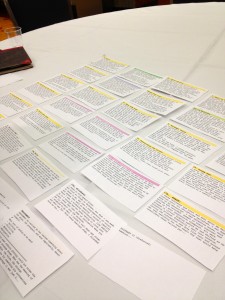

You may not be creating publishable words. You may not be creating amazing words. You may not be creating words you like. But by creating words, you are doing something actual, tangible, verifiable. And that puts you ahead of all the people who aren’t writing.
Someone once said to me at a party, “I would write, but I need to conquer some inner demons first.” And honestly — in my opinion, that’s bullshit unless he was talking about the inner demon of procrastination and not just being a pretentious jackass. Because, come on – who says that kind of thing and takes themself seriously?
Writers just fucking write.
Do you need to send stuff out? Do you need to polish what you’ve produced? Do you need to promote your writing? Yes, and yes, and yes, but all of those things are dependent on having written.
Let me reiterate this, because it’s important. Writing always comes first.
When I teach, we do a lot of writing exercises. And I hear people say, just before they read what they’ve produced, “I’m not sure I did this right.” And then they go on and read me something wonderful. Maybe it’s not exactly what I was envisioning when I came up with the exercise. Maybe they’ve turned the exercise on its head and done something completely different. But that’s okay. The only way they could do the exercise wrong, in my opinion, is to not do it.
I have seen stories workshopped that were…sometimes difficult to say much about. Some are seared on my memory; others kept me up at night trying to figure out what to say. Some were politically a bit problematic. But you know what? At least they got written.
If you are writing, you are being a writer. If you keep at it — and think about writing and getting better — you will get better. There are things you can do that will help you get better faster, but all of them depend on…well, you should know what I’m going to say here by now….writing.
If it’s fear of getting it wrong that’s stopping you, then knock it off. Here’s the reassurance you need. You cannot do it wrong.
Now go write some words.
Enjoy this writing advice and want more content like it? Check out the classes Cat gives via the Rambo Academy for Wayward Writers, which offers both on-demand and live online writing classes for fantasy and science fiction writers from Cat and other authors, including Ann Leckie, Seanan McGuire, Fran Wilde and other talents! All classes include three free slots.
Prefer to opt for weekly interaction, advice, opportunities to ask questions, and access to the Chez Rambo Discord community and critique group? Check out Cat’s Patreon. Or sample her writing here.
...

For example. The last few days I’ve been working at getting back into the flow of writing daily. I held myself accountable and post daily word counts here or on Twitter. And lemme tell you, some of those words were difficult to wrestle out of my skull and onto the page. One way I can tell things are going in difficult fits and spurts is that I’ll hop around a lot from story to story.
One of those projects is “Prairiedog Town” (which is definitely getting a different title). I started jotting down mental notes for it while traveling through Kansas, but only had a thousand words or so on it before last week. It was slow writing, partially because I wasn’t sure how I was getting from one point to another in the story. I knew it was a piece about a woman reclaiming her humanity and I had a good idea of what the penultimate scene would look like.
So I kept jotting words down in sporadic clumps of a few hundred at a time, yerking the story along in an awkward and impatient way. It helped when I incorporated a prompt from Sandra M. Odell, a woman finding an abandoned teddy bear by the road. But it still was slow slogging. Yesterday I took a break from it.
And then, this morning, while working on it, things began to fall into place. A secondary character had popped up, and I understood how to bring her back into the story — and why. A piece that was supposed to take three days suddenly shortened into a single night, and with that, the ultimate scene came clear. I went through, pulling the threads into place as close to a thousand words came spilling out and into the story.
It’s not done yet — maybe another thousand words to go, but I’ve got a map of it, and comments where I need to go back and insert things. Here, for example, is what a section of today’s work looks like:
They end up chatting. Talia asks after father. Relates that he’s died. Talia asks if she’s going to the funeral.
No
It’s what you’d say either way, isn’t it.
That’s true
I’ll be there. On the outskirts.She freezes again. It’s an old code word they used to use, back in the days when they worked together. It’s someplace close but (some distance) to the (direction).
And most importantly at all, things have come together to a point where I’m excited about the story, feel that some clever stuff has been worked in or has had places made for it. It’ll end up being around 4-5 thousand words, and I know I’ll finish it by the end of this month, because it’s designated as the next story to go out in the Patreon campaign.
And if I hadn’t done that picking away at it — scraping those words out of my skull, even though it felt painful and awkward and uninspired — I would have never gotten to that point at all.
Enjoy this writing advice and want more content like it? Check out the classes Cat gives via the Rambo Academy for Wayward Writers, which offers both on-demand and live online writing classes for fantasy and science fiction writers from Cat and other authors, including Ann Leckie, Seanan McGuire, Fran Wilde and other talents! All classes include three free slots.
Prefer to opt for weekly interaction, advice, opportunities to ask questions, and access to the Chez Rambo Discord community and critique group? Check out Cat’s Patreon. Or sample her writing here.
...

I have never been a good swimmer. It’s quite possible I never will be. When I was a kid, my parents kept enrolling me in swimming lessons, and I kept being a terrible swimmer who refused to put my head under water. Part of it was that I’d learned by then that if I got water in my ears, an ear infection wouldn’t be far behind, so every lesson was a silent battle to avoid putting my head underwater. It wasn’t till high school, when several friends decided I would learn to swim (bless you, Ann, Ann, Anne, and Maureen), that I actually got to the point where I could float long enough to survive a (fairly brief) period if I ever fell off a boat. Couple that with an illness that made me extremely self-conscious in a swimsuit for a long time, and you can see why I just don’t get in the water very much.
So here we are in Costa Rica, with a swimming pool right outside our balcony, and a temperature that makes that pool pretty darn inviting. So I got in and splashed around, and finally decided to do a little swimming. And you know what — I liked it. I liked it a lot. And found myself going back repeatedly. Right now I’m going to finsih up this post and then go do it some more.
It took a while to get over the panicked feeling that I was falling forward, that the water wouldn’t hold me up. I kept insisting on starting on the deeper end and swimming towards the shallower, because that way if I put a foot down, I’d be able to hit the bottom. But with every time I made it all the way, it got easier. I started trusting the water (and myself) more.
I’m not claiming I’m going to become a good swimmer anytime soon, or that I’m ever going to like getting water up my nose. But I’m better at it, and certainly more confident about it. And I’ve found something that I like doing, and that I will be trying to incorporate more in my life.
And that — as with so many things in life — applies to writing. Those first attempts to do something new and scary may well be awkward and uncomfortable. In fact, they probably will. Because that’s how we learn. It’s very hard to get good at something without being pretty bad at it at first. And in doing these things, you learn to trust the universe a little more. Which I see as a pretty good thing.
So it’s a Monday morning. Here’s my challenge for you. By Friday, go write or do something that scares you. And come back and tell me what you did.
Enjoy this writing advice and want more content like it? Check out the classes Cat gives via the Rambo Academy for Wayward Writers, which offers both on-demand and live online writing classes for fantasy and science fiction writers from Cat and other authors, including Ann Leckie, Seanan McGuire, Fran Wilde and other talents! All classes include three free slots.
Prefer to opt for weekly interaction, advice, opportunities to ask questions, and access to the Chez Rambo Discord community and critique group? Check out Cat’s Patreon. Or sample her writing here.
...

But for writers, I think it’s very important to go outside it on a regular basis. For one thing, your characters are going to be outside their comfort zones, being challenged, tested, thwarted, more often than not, because one thing about comfort zones is that they can be pretty darn boring to read about. Who wants a character for which everything goes right? (This is, I will argue, why the Richie Rich comic books were pretty darn bland.) How can you write a character outside their comfort zone if you don’t know what it’s like?
And outside our comfort zone is where we learn new things, new skills, new things about ourselves. Here in Costa Rica, my Spanish skill is leaping upward in a way it wouldn’t at home, despite all my best resolutions about daily Duolingo workouts or buying books in Spanish from Amazon. And that in turn has prodded me to try some new things with it, like using one of my stories as a practice piece in translation.
This is why, when I talk to students about going into a workshop like Clarion West or Viable Paradise, I urge them to try to fail. Because you learn so much more from a story where you tried something new and failed than one where you did the same thing you always did. I wrote Zeppelin Follies while at Clarion West as my very first try at a screwball comedy, and I will confess that the first draft was a horrible mishmash of stuff. And boy did I learn a lot from that.
Fortunately, for the vast majority of writers, we like new things. New words, new vistas, new thoughts. And we find them outside that comfort zone, in a place that is frightening and exhilarating all at once. Whizzing along a zipline, diving into waters over our head, talking to strangers. If you doubt that you are brave enough to do such things, remember that you do something braver everyday by putting your writing out there for other people to look at.
Enjoy this writing advice and want more content like it? Check out the classes Cat gives via the Rambo Academy for Wayward Writers, which offers both on-demand and live online writing classes for fantasy and science fiction writers from Cat and other authors, including Ann Leckie, Seanan McGuire, Fran Wilde and other talents! All classes include three free slots.
Prefer to opt for weekly interaction, advice, opportunities to ask questions, and access to the Chez Rambo Discord community and critique group? Check out Cat’s Patreon. Or sample her writing here.
...

The whole point of a short story is to assassinate the reader. You don’t have the time or the space to go to war or do large maneuvers, you can’t do chapters of elaborate setup, there’s much less room for character development””a good writer can get more character development in, but that isn’t my particular strength. Anyway, everything in the short story has to drive toward a short sharp point, whatever it is you’re trying to leave the reader with at the end of the story.
I say “assassinate” and it sounds hostile, because it is. I work better when I can think in terms of opponents. The thing is that I don’t want the reader to see the short sharp point clearly from the beginning, but I want it to make sense afterward as the angle of attack. Tactical sense, I guess, in the context of the story’s setup.
Most of the time I write didactically, as if a short story were a proof. There is some object lesson, or ethical question, I want to leave the reader with. “Ghostweight” is a good example of this; it doesn’t pretend not to be didactic. So when I build the character and their strengths and weaknesses and motivations, when I build the setting, the majority of it needs to be in support of that point. With a proof, you want to include all the necessary axioms and arguments, but leave out the extraneous. A short story is very similar. I am not sure my math professors would approve of the use I am making of my college education, but there it is.
To me this is connected to something Michael Swanwick told my Clarion West class: in a short story, pick your antelope out of the herd and chase it whole-heartedly. If you change course midstream because that other antelope is limping or that other one comes with a garnish, you are likely to have no antelope at all.
So you must determine your antelope, by which I mean, you must figure out what’s the emotional core of the story, what’s its heart? What does it say about the state of existence? And once you know that, you can construct a narrative that grabs the reader through devices like sensory engagement, identification with the main character, and other beguilements until you have them trapped, at which point you force them to confront some fact of existence that may be normally unseen or even actively avoided.
Enjoy this writing advice and want more content like it? Check out the classes Cat gives via the Rambo Academy for Wayward Writers, which offers both on-demand and live online writing classes for fantasy and science fiction writers from Cat and other authors, including Ann Leckie, Seanan McGuire, Fran Wilde and other talents! All classes include three free slots.
Prefer to opt for weekly interaction, advice, opportunities to ask questions, and access to the Chez Rambo Discord community and critique group? Check out Cat’s Patreon. Or sample her writing here.
...

I haven’t done that many. “Logic and Magic in the Time of the Boat Lift” with Ben Burgis resulted from Ben describing what he wanted to write a story about — Miami and were gators and coke dealers — at more than one Wiscon. I wrote the beginning and sent it his way, and the back and forth began. Now we’ve got a similar lump in process.
Gio Clairval and I just finished up a flash piece recently. One of the things I’ve done to encourage collaborations is stick a bunch of word lumps up in a Google doc and just shared the doc so people could take a look and see if anything sparked. She liked a piece I’d done based on an image of a female acrobat.
Right now Bud Sparhawk and I just finished the novella “Haunted,” which started as a short story and kept growing and growing and growing. Bud plots things out a bit more thoroughly than I do, and it’s been interesting so far. Here we worked in Scrivener and laid out a story arc in cards before really setting to writing. I enjoyed it, because I think we’ve got a killer idea, and some clever twists, and some things that will hit nostalgic sweetspots.
So here’s my advice on collaboration based on my experience, which is somewhere past utterly new at it and yet not in the range of people like Mercedes Lackey, Andre Norton, Mike Resnick, and countless more.
Collaborative benefits include (for me, at least) new energy, someone to discuss a story with as it’s written, new insights into process, fresh ideas, and a kick in the butt to be productive.
Enjoy this writing advice and want more content like it? Check out the classes Cat gives via the Rambo Academy for Wayward Writers, which offers both on-demand and live online writing classes for fantasy and science fiction writers from Cat and other authors, including Ann Leckie, Seanan McGuire, Fran Wilde and other talents! All classes include three free slots.
Prefer to opt for weekly interaction, advice, opportunities to ask questions, and access to the Chez Rambo Discord community and critique group? Check out Cat’s Patreon. Or sample her writing here.
...
 I’ve been teaching an advanced workshop that’s been a lot of fun. I gave them one of my favorite texts, an issue of Swamp Thing by Alan Moore called “Pog.” You might want to read it before proceeding on to the discussion of it. Go ahead, I’ll wait.
I’ve been teaching an advanced workshop that’s been a lot of fun. I gave them one of my favorite texts, an issue of Swamp Thing by Alan Moore called “Pog.” You might want to read it before proceeding on to the discussion of it. Go ahead, I’ll wait.
I picked that text because it has a high degree of emotional impact. It was a great starting point for talking about how to create that in a piece of fiction. In discussing how Moore achieved that, we realized that it is primarily constructed through the characters. While it’s nice to see the images, they are not the primary source of the impact.
Here are the five ways that impact is created:
So what takeaways for character building can one draw from this? Are there axioms that can be applied in one’s own writing? Of course there are, and here’s the list:
...
 We had the first session of the advanced workshop last night. I’m delighted by the mix, and expecting wonderful things from the class. Some are published already, some are just breaking in.
We had the first session of the advanced workshop last night. I’m delighted by the mix, and expecting wonderful things from the class. Some are published already, some are just breaking in.
Unlike the Writing Fantasy and Science Fiction Stories class, we are not focusing on one of the basics each week, like characters, plot, or world building. Instead, I am trying to let the class drive itself where it can. My hope is that everyone, by the end of class, has not just been critiqued a couple of times, but has a better sense of their writerly process and how to make it more efficient, more confidence in finishing stuff and getting it sent out, and new ways of moving story from idea to finished draft.
So here is the assignment I gave them, in the hope that it will prove useful for other writers trying to figure out their process:
Enjoy this writing advice and want more content like it? Check out the classes Cat gives via the Rambo Academy for Wayward Writers, which offers both on-demand and live online writing classes for fantasy and science fiction writers from Cat and other authors, including Ann Leckie, Seanan McGuire, Fran Wilde and other talents! All classes include three free slots.
Prefer to opt for weekly interaction, advice, opportunities to ask questions, and access to the Chez Rambo Discord community and critique group? Check out Cat’s Patreon. Or sample her writing here.
...
 The following comes from an email exchange between myself and John Barnes, whose story I critiqued and who has given permission to reprint the exchange 🙂 I know that this question often comes up for newer writers. They see writers who write long, elaborate sentences and wonder why they then get criticized for overly long and complicated sentences.
The following comes from an email exchange between myself and John Barnes, whose story I critiqued and who has given permission to reprint the exchange 🙂 I know that this question often comes up for newer writers. They see writers who write long, elaborate sentences and wonder why they then get criticized for overly long and complicated sentences.
John: When you said to work on writing on a sentence /paragraph level, were you referring to sentence structure or cutting needless words? Was it well-written? Would a good play on muscle memory to intersperse the story with flashes of memory, along the lines of what Aliette De Bodarde did with immersion?
The answer to the question in the first sentence is yes to both. I think that you are at a point in your writing where you should both be looking at constructing interesting, graceful sentences as well as making sure that you remove excess words. Extraneous language often gets in the way of a story’s speaking to a reader, muffling its impact.
I thought the language was competent, but still needs the final polish that removes any awkwardness or places where the prose calls attention to itself. One of the ways a writer convinces the reader to relax and give into the experience of the story is by convincing them they are in expert hands that will keep reminders that they are reading to a minimum. Awkward sentences or passages that are overly wordy can remind a reader that they are reading and generally are experienced as a negative rather than a positive.
Absolutely a good play on muscle memory that intersperses the story with flashes of memory would be great. To make it superlative, the language needs to be constructed as clearly as possible. If you go over “Immersion,” you will see that in every sentence, words are pulling their weight and there are no extras.
...
 Yesterday I spent a pleasant chunk of time talking to the Clarion West 2013 students, along with Django Wexler. Django and I were the “mystery muses,” a Friday feature for the CW students where people come in to chat about a specific aspect of the writerly life. Django spoke well to the experience of having one’s first major book come out, since his book (which I have read and heartily recommend) The Thousand Names just came out. He let us all know (to mass disappointment) that it doesn’t lead to being booked on the Leno or Daily Show or lavish book tours, though he did get to go to ComicCon.
Yesterday I spent a pleasant chunk of time talking to the Clarion West 2013 students, along with Django Wexler. Django and I were the “mystery muses,” a Friday feature for the CW students where people come in to chat about a specific aspect of the writerly life. Django spoke well to the experience of having one’s first major book come out, since his book (which I have read and heartily recommend) The Thousand Names just came out. He let us all know (to mass disappointment) that it doesn’t lead to being booked on the Leno or Daily Show or lavish book tours, though he did get to go to ComicCon.
I decided to talk about self-promotion and career building, since that’s advice I didn’t get a lot of while at Clarion West myself. And I came up with nine maxims, but lost that index card so I have an incomplete list. Maybe the students can chime in to tell me what I’ve forgotten.
Some other things that got mentioned:
And here’s something I didn’t mention, but which has come up a lot recently, as to what to blog about, both in terms of finding something interesting and not spending too much time on it: excerpts of what you’re working on both fulfills those terms and encourages you to get some words out.
Enjoy this advice for writers and want more content like it? Check out the classes Cat gives via the Rambo Academy for Wayward Writers, which offers both on-demand and live online writing classes for fantasy and science fiction writers from Cat and other authors, including Ann Leckie, Seanan McGuire, Fran Wilde and other talents! All classes include three free slots.
Prefer to opt for weekly interaction, advice, opportunities to ask questions, and access to the Chez Rambo Discord community and critique group? Check out Cat’s Patreon. Or sample her writing here.
...
Want access to a lively community of writers and readers, free writing classes, co-working sessions, special speakers, weekly writing games, random pictures and MORE for as little as $2? Check out Cat’s Patreon campaign.

"(On the writing F&SF workshop) Wanted to crow and say thanks: the first story I wrote after taking your class was my very first sale. Coincidence? nah….thanks so much."

(science fiction, story)
Decades later the music was what really tipped Glen off. He heard a song on the radio, a brand new release, and remembered the day he’d first heard it, twenty years earlier. Everything began to fall together then. Or maybe that was when it really started to shatter.


This site is protected by reCAPTCHA and the Google Privacy Policy and Terms of Service apply. This site is a participant in the Amazon Services LLC Associates Program, an affiliate advertising program designed to provide a means for sites to earn advertising fees by advertising and linking to Amazon.com.